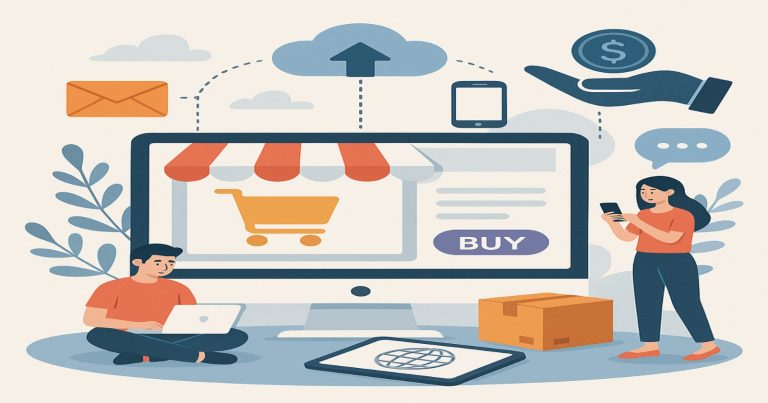Business models in the world are experiencing a huge shift toward the emerging modes of business that employ the use of technology, globalization, and innovative practices. This paradigm shift places much emphasis on electronic interactions, flexible business environments, and adaptive strategies that are supposed to appropriately respond to the changing climate of the dynamic market landscape. From e-business to outsourcing, all these modes of business are changing traditional modes of operation to ensure reach and efficiency, providing new ways through which to access customers and optimize resources effectively.
Electronic Business (E-Business)
E-business is a general term or expression for electronic business. It is the incorporation of electronic methods across all the functions of the business to have better efficiency, connectivity, and customer satisfaction. Such a mode of business goes beyond just online selling and includes aspects such as managing the supply chain maintaining customer service and even digital practices in HR. In this context, e-business represents more than a technological enhancement of traditional operations. Rather, it enhances both traditional operations with internet-related and other related technologies into a seamless experience for stakeholders.
Types of E-Business
E-business models can be classified into several types, each serving unique purposes and offering distinct advantages. Key types include:
- Business-to-Business (B2B): This approach sees transactions directly among businesses, focusing on wholesale suppliers, manufacturers, and intermediaries.
- Business-to-Consumer (B2C): In this model, one can state that business-to-consumer is a more straightforward way, where the direct selling of products or services happens between businesses and consumers through online platforms.
- Consumer-to-Consumer (C2C): In this model, individuals may sell their products or services to other individuals. It is akin to selling on eBay.
- Consumer-to-Business (C2B): In this model, consumers sell products or services to businesses. For example, a freelance platform where individuals sell their skills to companies.

Benefits of E-Business
E-business models offer multiple advantages, including:
- Global Reach: Companies can easily perform and serve customers without considerable geographical barriers.
- Low Costs: Automation and digital solutions eliminate the geographical needs of physical spaces and personnel, which further brings down associated costs.
- Better Customer Experience: Customized interactions and efficient communication paths offer better experiences to customers.
Disadvantages of E-Business
Despite its benefits, e-business has some limitations:
- Security Threats: Cybercrime and hacking are threats not just to sensitive information but also to customers’ trust in a company.
- High Initial Investment: Any investment into a developing digital framework and staff training is always high priced.
- Dependence on Technology: Heavily relying on technology often becomes problematic if systems crash or go offline.
E-Commerce
E-commerce is a form of e-business wherein purchases and selling of goods or services happen online. It is quite adaptable and scalable and provides multiple different modes of interaction, such as B2B and B2C to C2C transactions. E-commerce has proved to be the one that grows exponentially by changing retail trade and bringing an influence on customer behavior through ease, diversity, and being available 24/7.
Advantages of E-Commerce
E-commerce platforms bring the following advantages:
- Convenience: Customers can buy at any given time, from anywhere easily.
- Variety: Most of the products are available in huge assortments and often at competitive prices.
- Efficiency: The ability to automate order processing, payments, and logistics improves the overall transaction speed.
Outsourcing
Outsourcing is generally referred to as the act of delegating part of business functions or procedures to third-party service providers. Considering third-party vendors obtain significant improvements and provide expertise and resources relevantly. It has been a crucial element of modern business strategy that allows the facilitation of core activities while reaping the benefits of others’ skills and resources.
Need for Outsourcing
Outsourcing is very much prompted by the need for efficiency improvement and escalating business complexity. Most firms outsource IT services, payroll, or customer support to save costs, ensure quality, and free internal resources.
| Outsourced Function | Description |
|---|---|
| IT Services | Hiring external vendors to manage and maintain IT infrastructure. |
| Customer Support | Utilizing third-party call centers to handle customer inquiries. |
| Payroll Processing | Delegating payroll tasks to specialized companies. |
Concerns Over Outsourcing
While outsourcing offers numerous benefits, it also raises concerns, including:
- Quality Control: Outsourcing services must be up to a certain quality. This is difficult to carry on if outsourcing occurs to third parties.
- Data Privacy: Handling sensitive information requires robust protocols when one wants to avoid data breaches.
- Risks of Dependency: One ends up becoming too reliant on these external providers, eventually affecting continuity and losing control.
Emerging Modes of Business FAQ
What are some emerging modes of business in today’s world?
Emerging modes of business include e-business, e-commerce, and outsourcing. These models rely on digital technologies and global networks to operate efficiently.
How does e-business differ from traditional business?
E-business involves conducting various business activities electronically, which allows for global reach, cost savings, and improved customer interactions compared to traditional methods.
What is outsourcing, and why is it important?
Outsourcing is the practice of contracting out specific business functions to external vendors, helping companies focus on core activities and reduce costs.
What are the challenges associated with e-business?
E-business faces challenges like security risks, high setup costs, and technology dependence, which can disrupt business operations if not managed properly.
Why is e-commerce growing rapidly?
E-commerce is growing due to the convenience it offers consumers, as well as the efficiency and scalability it provides for businesses.


